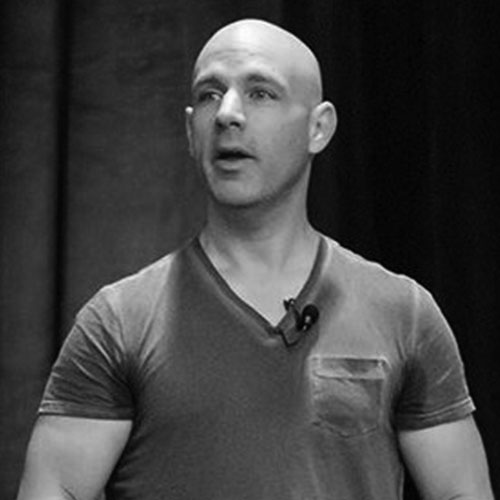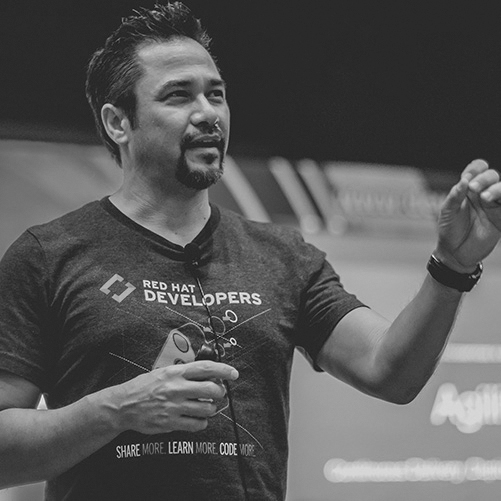Workshops! Monday, October 19
Yet another difference between 2019 and this year's event is the fact we're hosting all extended sessions/workshops on a single day - Monday, October 19.
We love extended sessions and workshops because they allow a deeper dive than a traditional 45 minute session. In a sense, you can learn a lot about one or a few topics as opposed to not as much about more topics. This approach, the former, really compliments the latter approach, which attendees will get on Tuesday the 20th.
Plan now to attend really good sessions on outstanding topics, delivered by truly world-class technologists.
Please note you must register for All Things Open to access the workshop sessions. There is no additional charge for workshops - they are included. Attendees will access sessions through the virtual platform.
Automating Developer Things with GitHub Action
Brian Douglas, Developer Advocate, GitHub
Abstract:
Join us for a hands-on workshop learning how to build GitHub Actions—the tool to automate your developer workflow from idea to production.
You’ll leave with a working knowledge on how automate your software development practices by creating end-to-end DevOps workflows to simplify and manage your issues, code, packages, CI, and deployment solutions all in one place.
Deploy Your Static Web App with Your Favorite Framework in Minutes
John Papa, Principal Cloud Advocate, Microsoft
Burke Holland, Developer Advocate, Microsoft
Abstract:
You've built an app and you want it to scale. Do you want CI/CD, custom domains, SSL certificates, APIs, global scale of your static assets, authentication, and authorization? And whether your favorite web framework is Svelte, Vue, React, Angular or something else entirely, you'll learn how to build a static web app on Azure and go from GitHub repo to global scale.
Open Source Software Licenses and Business Models Explained
Peter Zaitsev, CEO, Percona
Abstract:
There are many business models and licenses surrounding Open Source Software. In this presentation we will look into these business models and licenses impact the business and community. We will cover Services based models, Dual License, OpenSaaS, Open Core, and other business models.
Open Source Licensing: Types, Strategies and Processes
Jeff Luszcz, Consultant, ZebraCatZebra
Abstract:
Open Source powers the world, but you need to do more than use it.In this talk we will provide background on the most common types of open source licenses, business models, security issues and the processes required to help you remain secure and in compliance. We will discuss best practices, scanning tools, remediation, customer and partner expectations around OSS compliance and how to manage OSS during events such as a product release or M&A.
How would you like us to list your license? How to gain confidence in FOSS compliance
Carol Smith, Open Source Programs Manager, Microsoft
Duane O'Brien, Head of Open Source, Indeed
Abstract:
Every participant in the FOSS ecosystem relies on understanding how projects are licensed in order to meet their compliance obligations. Developers who build on FOSS must ensure they are confident about the licenses of the projects they've built on just as much as FOSS projects releasing their own software must ensure they feel confident the code they're releasing is compliant. Lack of clarity or confidence in FOSS projects' licensing builds on itself and makes it difficult for everyone to participate.Let's talk more about the challenges developers, projects, and organizations all face when licensing isn't clear for FOSS projects. We'll discuss particular examples of where lack of clarity was confusing or disruptive to the development process. Finally, let's talk about simple ways to address these problems and make sure everyone can work openly in the community using, contributing to, and releasing FOSS.
Open Source Design Contributions for your OSS project
Eriol Fox, Designer, Open Food Network & Open Source Design
Abigail Makolo, Product Designer & Open Source Design Advocate, ehealth4everyone
Abstract:
In 2019 we started a project called 'Open Design, a collaboration between Adobe, Designit and Ushahidi. Looking at increasing and sustaining design contribution to open source and advocating for OSS in design, and design in OSS.
Using Ushahidi's humanitarian OSS as a pilot case, we tackled the systemic problems with how to ‘open source’ a design effort and bring the community along with the ‘on-staff’ Ushahidi designers, we piloted a series of design events on Ushahidi’s OSS crisis communication tool TenFour with our partners Designit and Adobe. Together, we were looking to solve the problems with how open source design can work by engaging through meaningful technology that makes a difference in the world.
This session is aimed at getting OSS projects ready for design contributions. Covering the best first issues to attract design contributions and the processes involved in building a ‘design wing’ of your OSS community. We’ll briefly cover the history of the project and the main problems we attempted to solve and we’ll present the learning and adaptions to our workshop framework and methodology that aims to engage design teams and individuals that are not yet ‘on-board’ with OSS as an ethos or movement.
Looking into some the abstract deeper motivations for design professionals to contribute but also some practical tips on structuring issues, labelling and maintaining design (and extended functions like research, UX and product management) you’ll leave with a set of tools and methods you can apply to your OSS to engage with designers.
User Experience Secrets to Better Surveys & Happier Users
Kerry Thompson, SWAY UX
Dan Zola, SWAY UX
Abstract:
Let's face it, most product surveys are terrible.
Surveys are confusing, too long, or don't line up with how people think:
Q: "On a scale of 1 to 10, how much do you like this product?"
A: "Um, I don't know? A 7?"Break free of these antiquated survey questions that don't provide you real value.In this session gain insights from UX experts who will break down the do's and don'ts of conducting & constructing a survey. We'll discuss what makes a good survey, what makes a bad survey and…How to get the actionable data that you need to improve product design!
--
In this session you'll learn...
- How to create a survey that gets you the actionable data you need to improve your product design
- What questions to ask (and what questions not to)
- How to get more people to take complete your survey
- What subject lines get the best responses
- And why 1-10 rating scales are terrible! (Don’t worry, we'll tell you what to do instead)
Automating your infrastructure deployments in the Google Cloud, Azure, and AWS with Terraform
Devlin Duldulao, inmeta
Abstract:
Terraform is an amazing open-source toolset for automating infrastructure in the public and private cloud. This course will teach you the fundamentals of Terraform to deploy infrastructure in a consistent, repeatable manner across multiple services.
Systems Administrators and DevOps Engineers have always been charged to do more with less. Defining infrastructure in code and automating its deployment helps improve operational efficiency and lower administrative overhead. In this session, you'll learn foundational knowledge of Hashicorp's Terraform software, a toolset for infrastructure automation. First, you'll discover how open source tools, such as Terraform can be leveraged to implement Infrastructure as Code (IaC). Finally, you'll learn how to automate your infrastructure deployments in the AWS, Azure, and Google Cloud with Terraform.
Deploying your first modern web app in the cloud
Mike Coleman, AWS
Abstract:
In this session attendees will deploy a multi-tier web application into the cloud. The app will be comprised of a React front end, an Node.js API server, and a MySQL database. Additionally the application will leverage other cloud based services to provide security and basic machine learning functionality. After attending the workshop you should have a good understanding of how to to architect and deploy secure, scalable, multi-tier web applications. Attendees do not need to be developers, as the application code is already written. However, a basic familiarity with the Linux command line is helpful. Additionally, attendees will need a laptop with a modern web browser. Free temporary AWS accounts will be provided.
Understanding Distributed Systems with OpenTelemetry
Austin Parker, LightStep
Abstract:
In this workshop, you’ll learn about the history and theory behind OpenTelemetry and why it’s essential to developing and deploying modern software. We’ll learn by doing, taking an existing microservices application and instrumenting it for observability using the many tools OpenTelemetry provides. We’ll use open source tools, like Jaeger and Prometheus, to ingest this telemetry data and show how you can analyze it in order to understand the performance of the application and identify performance regressions in your software.
You’ll walk away from this workshop with an understanding of how OpenTelemetry works, how it benefits you, and how you can quickly instrument your own software for observability.
Big Data Made Easy with Spark 3.0
Jean-Georges Perrin, Advance Auto Parts
Abstract:
In this hands-on session, fully updated for Spark 3.0, you will learn how to do a full Big Data scenario from ingestion to publication. You will see how we can use Java and Apache Spark to ingest data, perform some transformations, save the data. You will then perform a second lab where you will run your very first Machine Learning algorithm! We will demystify the magic behind Big Data analytics and jump into a pragmatic way to build our use-case.
Requirements to follow the lab: a recent Eclipse (or equivalent) installation, Java 8. Checklist for warming up: http://jgp.net/ato. The slides will be different.
Audience:
Software and data engineers who want to learn about Apache Spark. Basic Java knowledge is desirable. Experience with git and GitHub.
Key Takeaways:
Basics about Apache Spark – 20%. Walking through a complete scenario – 80%.
Note: this is a fully updated session, based on Spark 3.0, as well as more adapted to hands-on in a big crowd.
MySQL Indexes, Histograms, Locking Options, and Other Ways to Speed Up Your Queries
Dave Stokes, Oracle
Abstract:
Slow query? Add an index or two! But things are suddenly even slower! Indexes are great tools to speed data lookup but have overhead issues. Histograms don’t have that overhead but may not be suited. And how you lock rows also effects performance. So what do you do to speed up queries smartly?
All Things Containers - Docker, Kubernetes, Helm, Istio, GitOps and more
Brent Laster, SAS
Abstract:
In this workshop, students will get a quick overview of what containers are and why they form the basis for many of the key technologies that we use today in cloud environments.We’ll explore what makes up a container and how they are managed and leveraged in key industry tooling including Docker, Kubernetes, Helm, and Istio. You’ll also learn the basics of these technologies, what they are used for, and see some simple examples of how to use them.
This workshop will include hands-on labs where you will get experience:
- Building container images, running them as containers, and tagging and pushing them into a Docker repository.
- Creating deployments, services, and pods for containers and instantiating and running those in Kubernetes.
- Working with Helm to leverage templates for Kubernetes objects and managing releases in Kubernetes.
- Working with Istio to do traffic shaping between multiple versions of your app, fault and delay injection for testing and validation in Kubernetes.
- We’ll also briefly cover GitOps – the recommended Git-based way to manage infrastructure like your Kubernetes cluster.
Building Secure Kubernetes Clusters with Identity Management
*please note this has a 100 person limit*
Marc Boorshtein, Tremolo Security
Abstract:
What goes into building a secure kubernetes cluster? Most of the reading you’ll find focuses on TLS and container design. An area that is often overlooked is identity management. Who’s accessing the cluster? Why do they need access? Do they still need access? Are they accessing the cluster using the correct credentials? In this class we’ll build a kubernetes cluster with identity management as the primary focus. You’ll learn how to:
- Integrate a running cluster with OpenID Connect
- Automate the creation of network and pod security policies
- Lock down access to the Kubernetes dashboard
- Build and debug RBAC policies, as well as automate them
- In addition to locking down your cluster, we’ll explore how identity interacts through your pipeline and container registry strategies. By the time you’re done with this class you’ll have seen how identity and automation plays a crucial role in securing your clusters.
This class is not an introduction to Kubernetes. It is highly recommended to have some familiarity with Kubernetes prior to this workshop. Attendees should plan to bring a laptop with an SSH client and browser. Having the local kubectl utilities is a bonus. All other lab materials will be provided.
Back to Basics: Kubernetes
Burr Sutter, Red Hat
Abstract:
In this fast paced session, we will be learning the fundamentals of Kubernetes and the power of the Pod - the open source container orchestrator by the Cloud Native Computing Foundation.Be prepared to interact with other attendees and the instructor on this journey that includes the open hybrid cloud, Kubernetes, tooling, terminology, concepts, and practical exercises of how you can apply, deploy, and use Kubernetes to meet your cloud native application needs.
Key agenda items include:
- Why use Kubernetes
- What are the key Kubernetes components and terminology
- Installation of minikube (or OpenShift)
- kubectl
- Pod, ReplicaSet, Deployment, Service
- Application Deployment techniques
- Logs
- Rolling updates
- Live and Ready
Installation steps prior to the session:
https://redhat-scholars.github.io/kubernetes-tutorial/kubernetes-tutorial/installation.html
Nebula, an open source scalable overlay networking tool
Ryan Huber, Defined Networking, Inc.
A reference architecture for running modern APIs with NGINX Unit and NGINX web server
Liam Crilly, Dir, Product Management, NGINX
Abstract:
You will learn how to use NGINX Unit to run one or more apps and APIs in a variety of languages, including seamlessly deploying new versions. You will then see the best practices for how to configure NGINX to perform the common API gateway functions of request routing, rate limiting, and authentication for multiple APIs. We will also touch on advanced use cases such as HTTP method enforcement, and JSON validation.
No previous experience of NGINX or NGINX Unit is required, but a basic knowledge of HTTP and JSON/REST APIs is valuable.
Contributing to Elasticsearch
Nik Everett, Elasticsearch
Abstract:
Elasticsearch is an open source distributed, RESTful search engine used for everything from log analytics to application performance monitoring to on site search to security incident response. NASA and Facebook and Verizon and Microsoft and Wikipedia all use it. I'll introduce you to the code, help you find a beginner friendly thing to work on, and walk you through setting up your development environment.
I opened my first pull request in 2013 while I was working on a fairly high traffic on site search deployment. I joined Elastic in 2015 to be a full time Elasticsearch hacker.
Elasticsearch is built with Java which isn't the newest, shiniest language on the block. But it gets the job done. And it lets us stand on the shoulders of giants.
The docs are written in AsciiDoc and could always use more contributors too! Everyone that writes features for Elasticsearch has to write the docs for those features, so if you contribute to Elasticsearch for long enough you'll need to learn that too!
Yes, your applications are under attack: Protecting each step of the development lifecycle
Maury Cupitt, Sonatype
Abstract:
Your developer supply chain is constantly under attack, from the download of vulnerable components, to the licensing and governance of those components, all the way through monitoring their use in the production environment. In this workshop/lecture, Maury Cupitt will look at each phase of the development lifecycle and show how to protect each of those phases using the Nexus Platform.
Peel Back the Layers of Your Enterprise with the NEW Security Onion 2.0!
Doug Burks, Security Onion Solutions
Abstract:
Security Onion is a free and open source platform for threat hunting, enterprise security monitoring, and log management. We've got a new container-based platform that is more flexible, more powerful, and more scalable than ever before. Join us to see how you can peel back the layers of your enterprise and make your adversaries cry!
Be sure to register today to attend both days of All Things Open 2020. For the first time ever there is a FREE option, courtesy of our Presenting Sponsors.
EVENT OVERVIEW
Take a quick look at the 2020 All Things Open conference, including highlights and special events.
Open Source 101 2021
Our next in-person event will be in downtown Austin, TX next March 30. Learn more and see a few of the confirmed speakers.

























